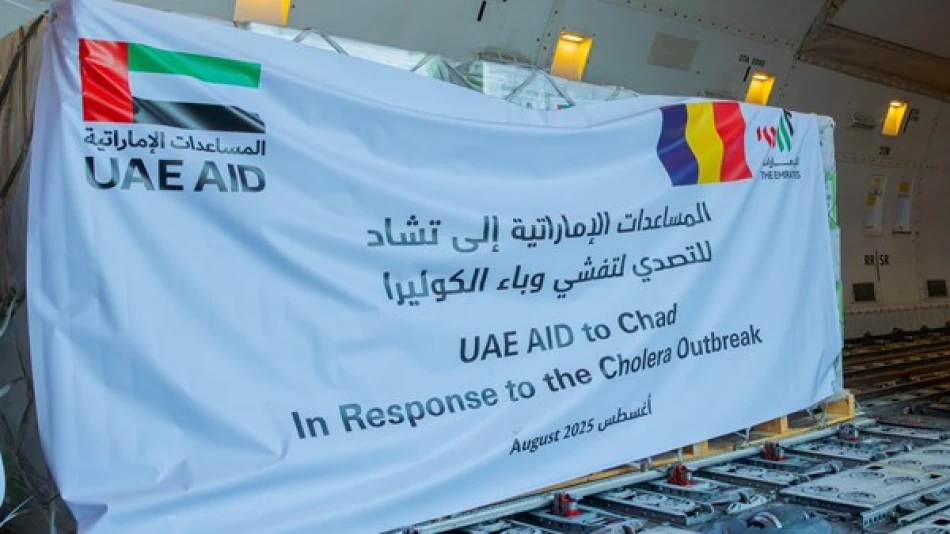
UAE Sends Critical 30-Ton Medical Aid Shipment to Chad's COVID-19 Response
UAE Rushes Medical Aid to Chad as Global Cholera Crisis Intensifies
The United Arab Emirates has dispatched 30 tons of critical medical supplies and medicines to Chad to combat a spreading cholera outbreak, highlighting the Gulf nation's expanding role as a regional health security provider amid warnings from the World Health Organization that the global cholera situation continues to deteriorate. The swift response underscores how middle powers are increasingly filling gaps in international health emergency response as traditional donors face budget constraints.
A Growing Global Health Emergency
The WHO's latest figures paint a stark picture of cholera's resurgence worldwide. Over 390,000 cases and 4,332 deaths have been reported across 31 countries in 2024 alone, representing a significant escalation from previous years. Chad, a landlocked nation already grappling with political instability and economic challenges, has emerged as one of the outbreak's focal points.
This cholera surge reflects broader systemic vulnerabilities in global health infrastructure. Climate change has intensified flooding patterns across sub-Saharan Africa, creating ideal breeding conditions for waterborne diseases. Simultaneously, ongoing conflicts and economic pressures have weakened healthcare systems precisely when they're needed most.
Why Chad Matters Strategically
Chad's geographic position makes it a critical node for disease containment in Central Africa. Bordered by six countries including Sudan, Libya, and Nigeria, an uncontrolled outbreak could rapidly spread across the Sahel region. The country's limited healthcare infrastructure—with just 0.4 doctors per 1,000 people according to World Bank data—makes external assistance not just helpful but essential for containment.
UAE's Calculated Humanitarian Diplomacy
Dr. Tariq Ahmed Al Ameri, head of the UAE's International Aid Agency, emphasized the country's commitment to addressing health challenges globally under President Sheikh Mohamed bin Zayed Al Nahyan's leadership. This aid package represents more than humanitarian goodwill—it's part of a sophisticated soft power strategy that has seen the UAE emerge as a major player in international development assistance.
The UAE's approach differs markedly from traditional Western aid models. Rather than lengthy bureaucratic processes, Emirati assistance tends to be rapid and direct, often arriving within days of a crisis emerging. This speed advantage has made the UAE an increasingly preferred partner for countries facing immediate health emergencies.
Comparing Regional Approaches
The UAE's response contrasts with other Gulf states' international engagement strategies. While Saudi Arabia focuses heavily on Islamic world partnerships through organizations like the Islamic Development Bank, and Qatar emphasizes high-profile humanitarian initiatives, the UAE has built a more diversified global presence that spans continents and religious boundaries.
This approach mirrors Singapore's earlier evolution from aid recipient to donor, using targeted assistance to build diplomatic relationships and secure long-term strategic partnerships. For the UAE, health diplomacy serves multiple purposes: enhancing global reputation, building influence in Africa's growing markets, and creating goodwill that translates into political support in international forums.
The Economics of Health Security
From an investment perspective, the UAE's health diplomacy represents a calculated long-term strategy. Africa's population is projected to double by 2050, creating enormous market opportunities for countries that establish early partnerships. By positioning itself as a reliable crisis response partner, the UAE builds relationships that could prove valuable as African economies develop.
The immediate cost of medical supplies pales in comparison to the potential economic disruption of allowing disease outbreaks to spread unchecked. Cholera outbreaks can devastate trade relationships, disrupt supply chains, and create refugee flows that affect regional stability. Swift containment efforts protect these broader economic interests.
Looking Beyond the Immediate Crisis
The UAE's commitment to continuing its international aid programs through systematic partnerships with global organizations suggests this isn't a one-off gesture. Al Ameri's emphasis on creating "tangible and sustainable impact" indicates a shift toward longer-term capacity building rather than just emergency response.
This evolution reflects lessons learned from previous health crises, including COVID-19, where countries with robust international health partnerships fared better than those operating in isolation. As global health challenges intensify due to climate change and urbanization pressures, countries like the UAE that invest early in health diplomacy infrastructure are likely to see significant returns on their strategic foresight.
The success of this intervention will be measured not just in lives saved, but in whether it helps establish sustainable disease surveillance and response systems that can prevent future outbreaks from reaching crisis levels.
Most Viewed News

 Layla Al Mansoori
Layla Al Mansoori






